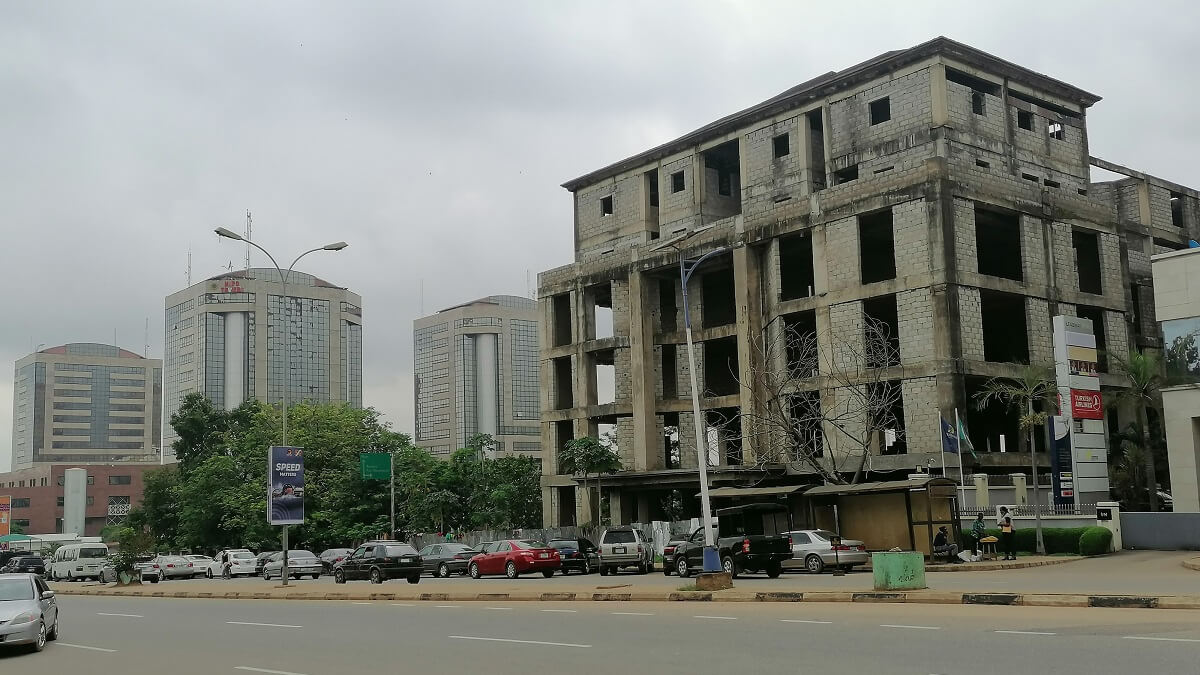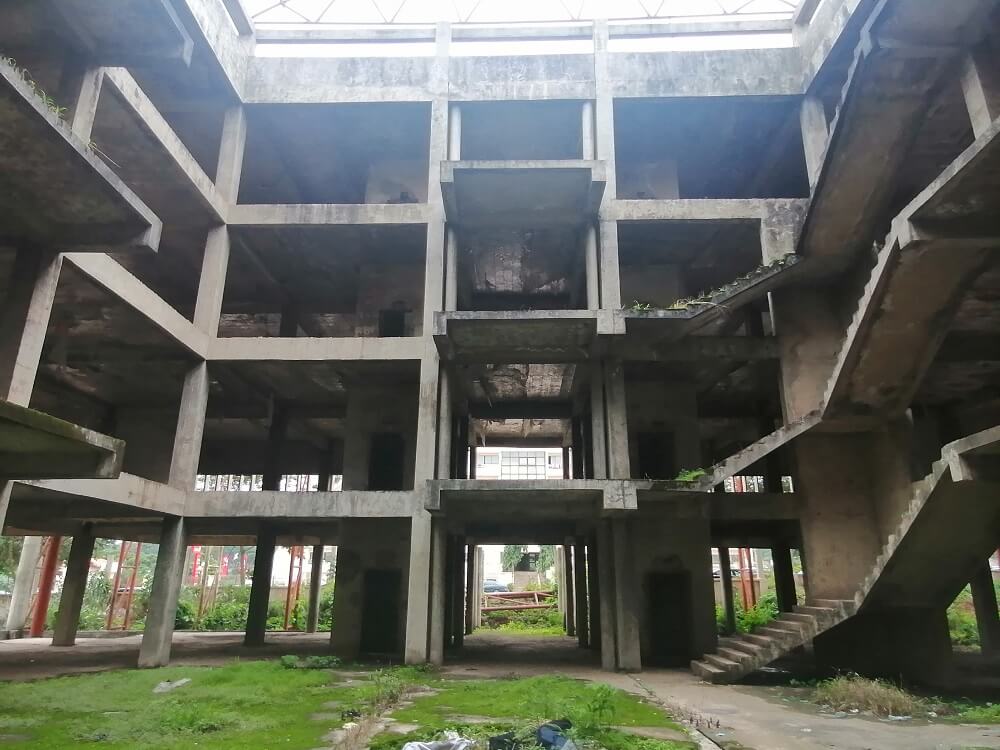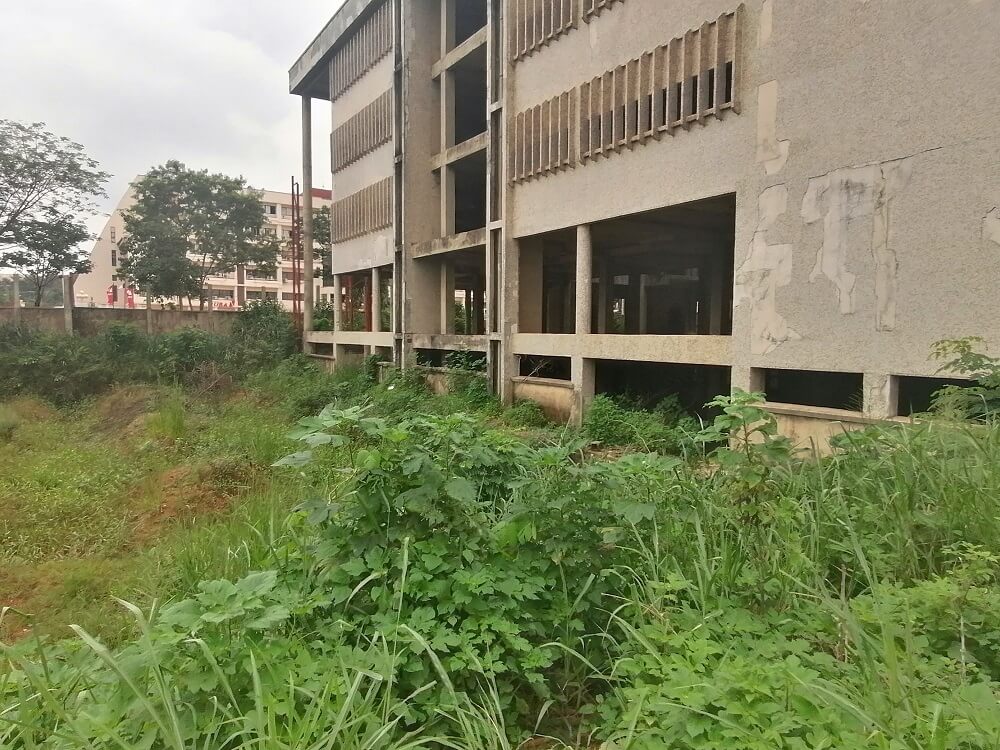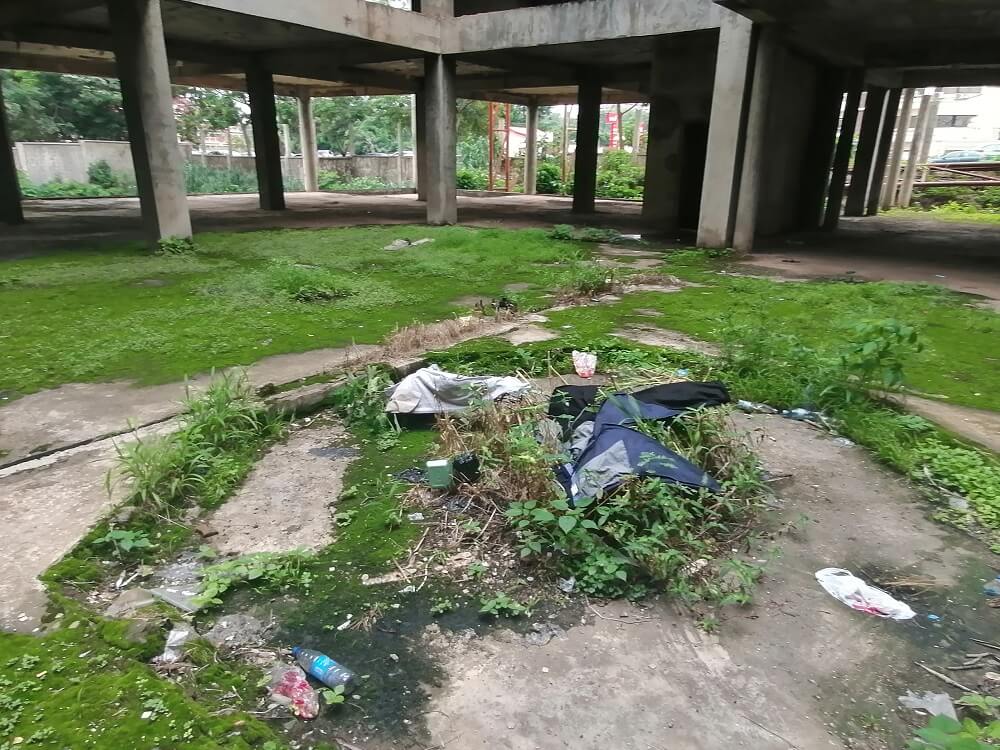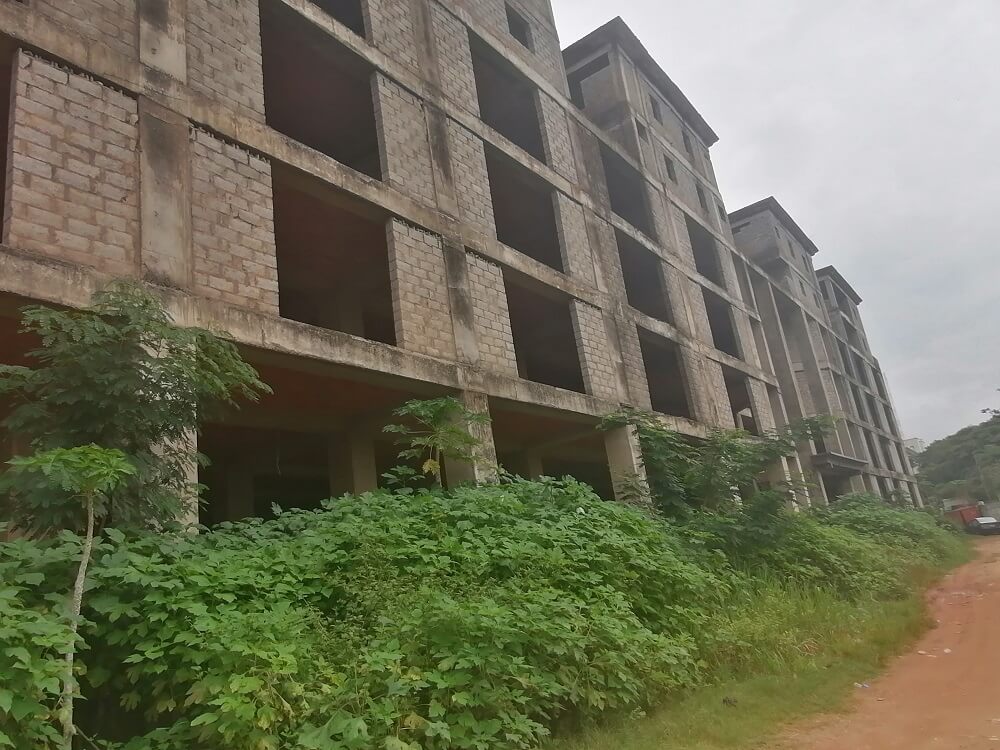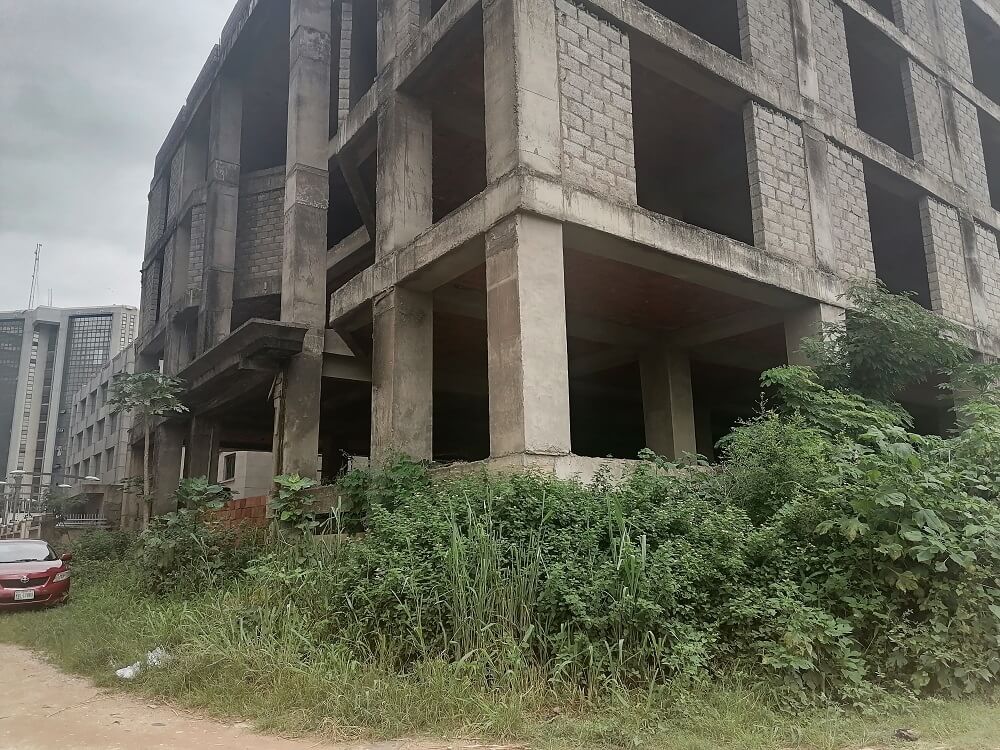The NNPC Towers and the Central Bank of Nigeria Building, both iconic national edifices, amongst others, may be vulnerable to attack by unscrupulous interests and terrorists who may hide to unleash attacks in the several high rise uncompleted buildings surrounding them.
There are believed to be more than 460 abandoned buildings in the Federal Capital Territory, according to the Abuja Metropolitan Management Council (AMMC).
Advertisement
Security experts have warned that abandoned buildings can become safe haven for terrorists, kidnappers and other criminal elements.
Even though such buildings are raided occasionally, criminals still take refuge in them to carry out despicable activities.
“They (abandoned or uncompleted buildings) are hideouts for criminal elements as well as other actors whose activities affect the security environment in the FCT,” Security Risk Management and Intelligence expert, Kabir Adamu, told THE WHISTLER in a recent interview.
Nigeria has battled Boko Haram insurgents since 2019 till date. Activities of the insurgents have led to the death of about 350,000 people, according to the United Nations Development Programme (UNDP).
Advertisement
The country’s administrative and political capital, Abuja, witnessed its last attack from the insurgents in June 2014. There was renewed fear in April 2021 that the insurgents may overrun the nation’s capital after Niger State Governor, Sani Bello, revealed that more than 50 communities in the state had been taken over by the insurgents.
Besides insurgency, the nation recorded 2,371 abduction cases in the first half of 2021, with Abuja accounting for 50, according to a report by SBM Intelligence.
“The total ransoms demanded topped N10 billion ($19.96 million as of 30 June), but we have been able to accurately compute the ransoms paid,” read the report dated July 2021.
The security situation has called for the retooling of crime-fighting strategy and increased surveillance by security agencies.
Also, one area that security experts have noted as constituting “huge problem” to security in the FCT is the issue of abandoned or uncompleted buildings.
Advertisement
Many properties worth billions of naira are either incomplete or abandoned with no definite timeline or plan by their owners to complete them.
THE WHISTLER visited some of such buildings in the Central Business District, Abuja.
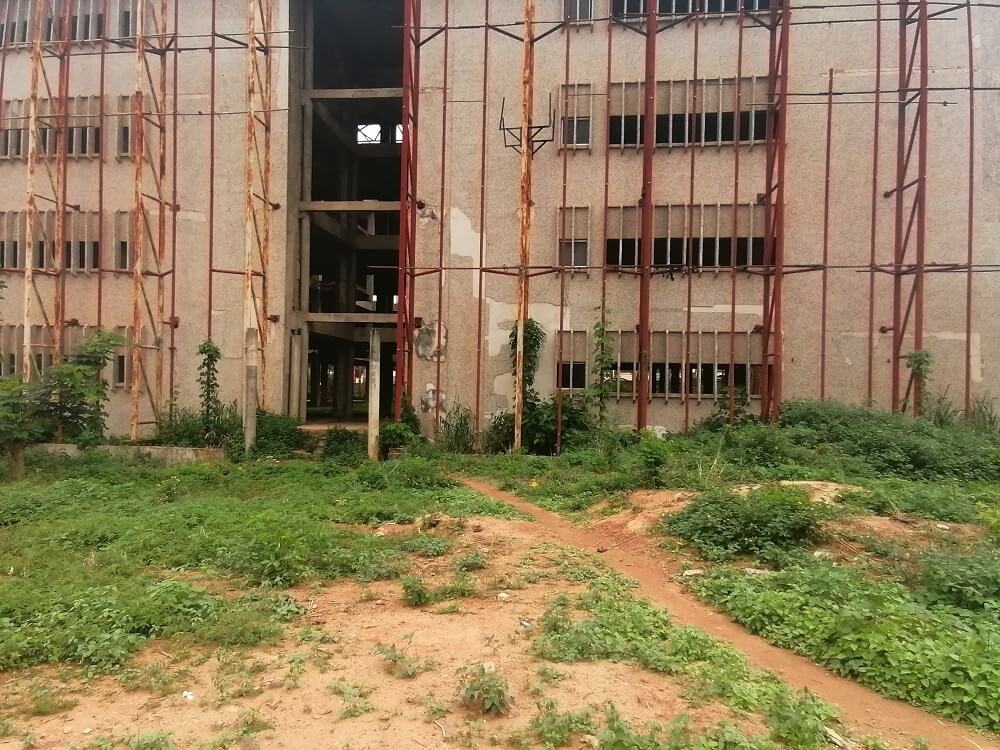
THE WHISTLER gathered that this building situated in the CBD is older than 12 years. 
At one of the locations where three abandoned buildings were clustered together, none of those who spoke to our correspondent knew when the constructions started or how long they had been abandoned.
The structures are situated along the Zakariya Maimalari street, off Tafawa Balewa Way.
An untarred road leading to a cul-de-sac takes you to three of the buildings which are located few minutes away from significant government and private institutions, including the Central Bank of Nigeria, Afri Hotel and Legacy Pensions, amongst others.
Advertisement
THE WHISTLER gathered that one of the structures, a three-storey building with an underground floor, had been abandoned for more than a decade. But a footpath leading to the structure indicated that people frequently went inside.
Inside the building were some clothes draped over the grass on the ground floor and a part of that floor looked neatly kept, indicating that it was being swept daily or regularly.

The abandoned building with an underground floor is situated along the Zakariya Maimalari street, off Tafawa Balewa Way. 
Clothes are draped over the grass on the ground floor.
Anita, who sells snacks in a small kiosk around the area, told our reporter that she did not know who owns the main building, but noted that an old man believed to be the caretaker comes around once in a while.
“One cannot predict when next he will be coming. He just visits from time to time” she said when asked how frequently the old man comes to check the building.
Another abandoned building, a massive five storey structure also with an underground floor, is situated adjacent to the Nigerian National Petroleum Corporation (NNPC) towers, along the Herbert Macaulay Way, in the CBD.
THE WHISTLER gathered that the construction stalled after the owner of the building, a “big man” from Kano State, died some years back.
The owner was said to have started and completed similar projects in Lagos and Kano States, but died before the one in Abuja could be completed. The deceased’s family, it was gathered, have rejected several offers to sell off the property or partner with developers to have the six-year-old building completed.

This five storey building which is adjacent the NNPC towers is abandoned and surroundd by bushes.. 
The building which is currently surrounded by bushes is being looked after by a man (Mai Shayi) who prepares and sells bread and tea at the premises.
Directly behind the building sits a multi-billion-naira facility that has been under construction for the past 7 years and may not be completed in the next four years.
The 13-storey building is a hotel being developed by Efab Properties. It seeks to rival the 12-storeyed Transcorp Hilton, Abuja.
Kate, store keeper of the facility, told THE WHISTLER that many factors were responsible for delays or suspension of work during the course of erecting such gigantic structures.
“As you can see, this is not a small project. The foundation alone can build four story buildings and furnish it,” she said, noting that the high cost of building materials may prompt the developer to pause construction and wait for prices to go down.
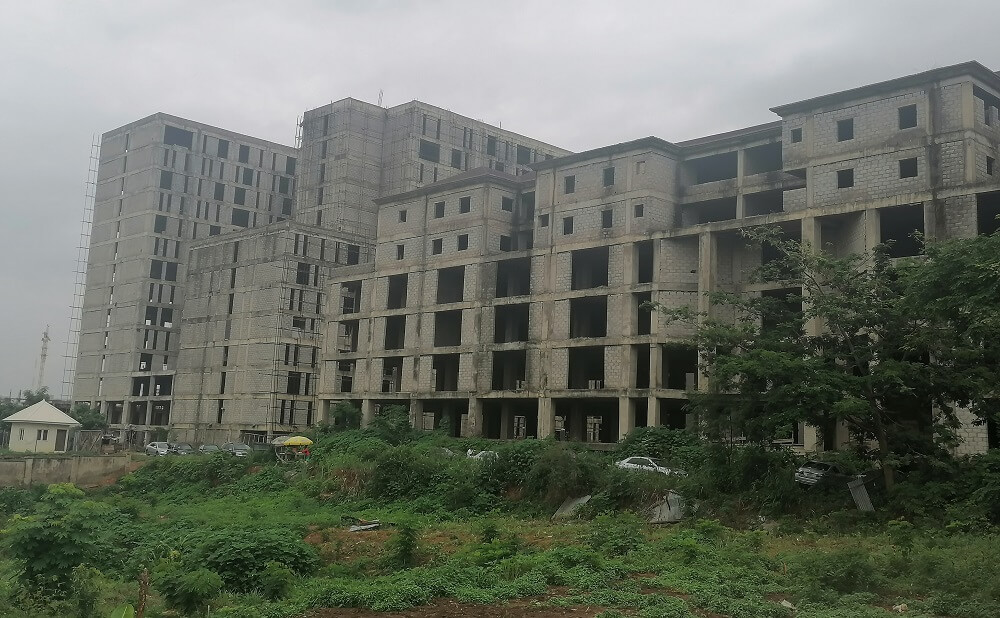
More than a billion naira had gone into casting the foundation alone, said Kate.
“If you want to finish this building alone, we may still spend up to four years because finishing takes time.
“The money that we will put in to finish this structure will be two times what we’ve already spent.
“When you talk of electrical work and installation of Air Conditioners alone, we would be looking at N7.5 to N8 billion,” she said.
Kate added, “Sometimes we do have delays in supply of materials. There was a time when iron was scarce, so we had a delay. Another delay was experienced when our crane broke down, so we had to put it in order. Sometimes we will not have cement.”
Dangers To Lives And Public Infrastructure
Adamu Kabir, founder of Beacon Consulting, a security risk management and intelligence company, told THE WHISTLER that when buildings are abandoned or left unoccupied for years, they become hideouts for criminals and societal miscreants.
This, he said, was why security agencies raid such buildings whenever they receive intelligence about a security threat.
“And interestingly, this is known to the security agencies and that is why ahead of any significant occasion or when they have any intelligence on impending security challenges, they raid these uncompleted buildings.
“What they (security agencies) do is that they raid such locations then after the raid, give it a few days, they come back for the simple reason that there is no sort of stationary presence that would deny them from coming back.
“And in terms of the uncompleted buildings, there is no effort to either dominate those places or stop them from being used as hideouts by these criminal elements. So, the [uncompleted] buildings are a huge problem on the security environment.”
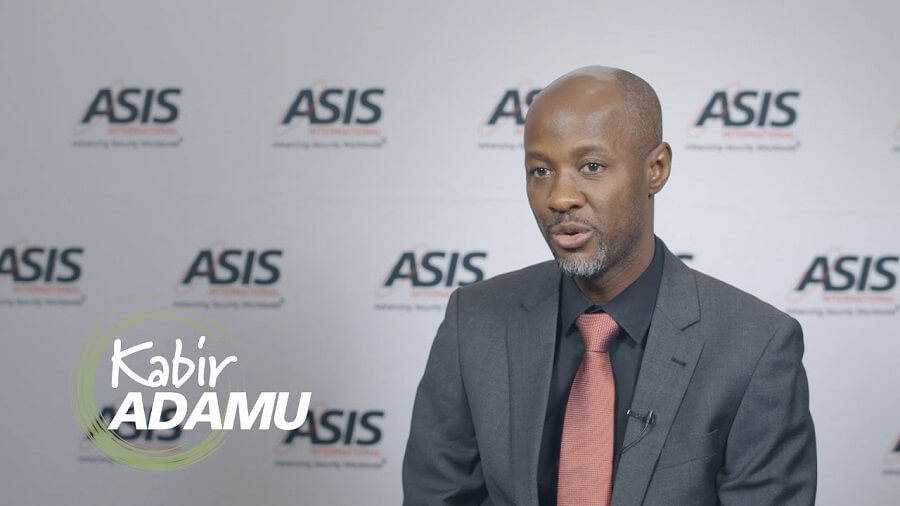
On what could be done to address the situation, he said: “The most important thing is to first do an audit, identify them and know who owns them.”
He said if such buildings are owned by government authorities or consuls, steps must be taken to ensure they are completed or auctioned if not needed so that private individuals who need them can take them over.
“If it’s for private individuals, what does the law say? As far as I remember, there are several times where circulars have been issued. In that stance, they should give owners of such buildings time within which to complete them or sell them off. If they don’t, then the government has the right to either take over for public safety. In this instance, this is a good example where public safety can override personal consideration.”
Kabir said it was “absolutely unacceptable” to have huge abandoned or uncompleted buildings in the city centre or around significant government institutions.
He added that where it is not a case of an uncompleted building, “they should increase the lighting there and enhance ways that those roads should be used because for some reasons pedestrians don’t like using some of those roads.”
He further advised that installing CCTV cameras at strategic locations and monitoring them could help security agencies have an eye on what is happening there.
On what could be responsible for increasing cases of kidnapping in the FCT, Kabir said the city is “coterminous to states that have high frequency of kidnapping. You look at Nasarawa, Niger, Kaduna and then Kogi States. In fact, it is only Kogi that would say even has lower (occurrences) compared to the others I mentioned.”
“Now, it is only natural, for lack of a better word, because the FCT is surrounded by these states that it could also be affecting the FCT.”
No Law Prohibiting Abandoned, Uncompleted Building
Meanwhile, the Abuja Metropolitan Management Council (AMMC) said there is no law forbidding persons from having abandoned or uncompleted buildings in the federal capital.
James Larry Afu, AMMC’s head of information, told THE WHISTLER at the Wuse office of the agency that there were currently more than 460 uncompleted buildings in the Federal Capital Territory.
If this is added to the number of unsubscribed housing units built by estate developers, the number of abandoned structures in the FCT could run into thousands.
“Most of those uncompleted buildings you see around the city centre got approval. But at a point, maybe the developers ran out of funds then the buildings are left unattended to,” he said.
Afu said some buildings were abandoned or left incomplete due to family disagreements after the original owners might have died.
Properties involved in litigation due to violation of buildings or other reasons may also be abandoned pending the outcome of the case.
Asked if owners of properties or developers are not given specific timelines of completion when building projects are approved, Afu said “no, there is no timeline” adding that “there is no law” that permits the government to take over properties abandoned or left uncompleted for years.
“We only make threats that we will revoke the approval. Even when we revoke, the person would still go to court and since there is no law as per that, they would win the case,” he said.
Developers are said to be free to choose when to move to site as long as they settle the fees required for such projects.
“If we give you a letter of conveyance, that letter of conveyance has given you the go-ahead to start building. But you’re supposed to pay a bill at the bank. Most often, when they get this conveyance letter that has given them the go-ahead to start, the person would just go there and start the work and won’t come back to pay his bill,” he said.
Afu said the agency was now making efforts to ensure that developers pay the required fees, “because we want to recover government revenue”.
On if the AMMC was aware that abandoned or uncompleted buildings could be used as hideouts by kidnappers and other criminal elements, Afu said “of course, we had embarked on ejecting persons from these uncompleted buildings times without number.”
The agency now focuses on violators of approved building plans due to the “high volume of work” its officials are faced with.
“Because getting approval is one thing and building according to what was approved is another thing,” he said.
He noted that developers who patronize unrecognized architects may end up getting a building plan that does not fit what was approved by the AMMC because such architects may not visit the site of the project.
“By the time you take an engineer to the site, he will tell you this plan cannot be achieved. In that situation, you would deviate from what was approved for you. And in such a situation, you were supposed to have come back to us and revalidate rather than deviating,” said Afu.
He said this was the case with most houses that are half built or abandoned.
Afu added that another situation is when, “one person, not minding how he invests his money, gets multiple lands and wants to build (all at the same time)” and ends up littering the city with uncompleted buildings after running out of funds.
– This report was supported by the Civic Media Lab, Lagos.


